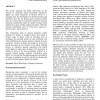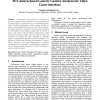1817 search results - page 10 / 364 » Extensive Games as Process Models |
121
click to vote
WCRE
2003
IEEE
15 years 7 months ago
2003
IEEE
Reverse Engineering is a process fraught with imperfections. The importance of dealing with non-precise, possibly inconsistent data explicitly when interacting with the reverse en...
129
click to vote
GAMEON
2009
15 years 10 days ago
2009
This article, assuming that player motivations are the outcome of continuous player-environment interactions, applies the needs framework of Murray (1938) to a computer game and i...
129
click to vote
NJC
2002
15 years 2 months ago
2002
The tcc model is a formalism for reactive concurrent constraint programming. We present a model of temporal concurrent constraint programming which adds to tcc the capability of mo...
124
Voted
CAV
2005
Springer
15 years 8 months ago
2005
Springer
Model checking has proven to be an effective technology for verification and debugging in hardware and more recently in software domains. We believe that recent trends in both th...
144
Voted
IPCV
2010
15 years 14 days ago
2010
- Conventional video games are controlled by players via physical game controllers. A new emerging trend for game control in recent years is to use intelligent sensor based interfa...


